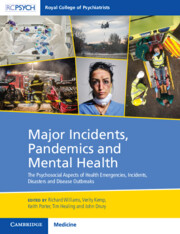 Major Incidents, Pandemics and Mental Health
Major Incidents, Pandemics and Mental Health from Section 1 - The Nature and Impacts of Twenty-First-Century Healthcare Emergencies
Published online by Cambridge University Press: 11 January 2024
More than half of the world’s population now live in urban areas, many of them in low- and low-middle-income countries with limited ability to support urban growth. Urban areas are inherently fragile. Many cities are desperately overcrowded, with poor building construction, limited access, poor or absent waste disposal, limited or no access to clean water, irregular supplies of food, unreliable power supplies, inadequate emergency services, and problems with crime and violence. Healthcare is often poor or absent, with an increased risk of communicable disease outbreaks. Supply chains can easily be interrupted. Urban poverty and slums are proliferating with informal dwellings in areas vulnerable to natural disasters. The nature of urban areas can increase the impact of disasters, as was shown by the impact of the COVID-19 pandemic.
To save this book to your Kindle, first ensure no-reply@cambridge.org is added to your Approved Personal Document E-mail List under your Personal Document Settings on the Manage Your Content and Devices page of your Amazon account. Then enter the ‘name’ part of your Kindle email address below. Find out more about saving to your Kindle.
Note you can select to save to either the @free.kindle.com or @kindle.com variations. ‘@free.kindle.com’ emails are free but can only be saved to your device when it is connected to wi-fi. ‘@kindle.com’ emails can be delivered even when you are not connected to wi-fi, but note that service fees apply.
Find out more about the Kindle Personal Document Service.
To save content items to your account, please confirm that you agree to abide by our usage policies. If this is the first time you use this feature, you will be asked to authorise Cambridge Core to connect with your account. Find out more about saving content to Dropbox.
To save content items to your account, please confirm that you agree to abide by our usage policies. If this is the first time you use this feature, you will be asked to authorise Cambridge Core to connect with your account. Find out more about saving content to Google Drive.